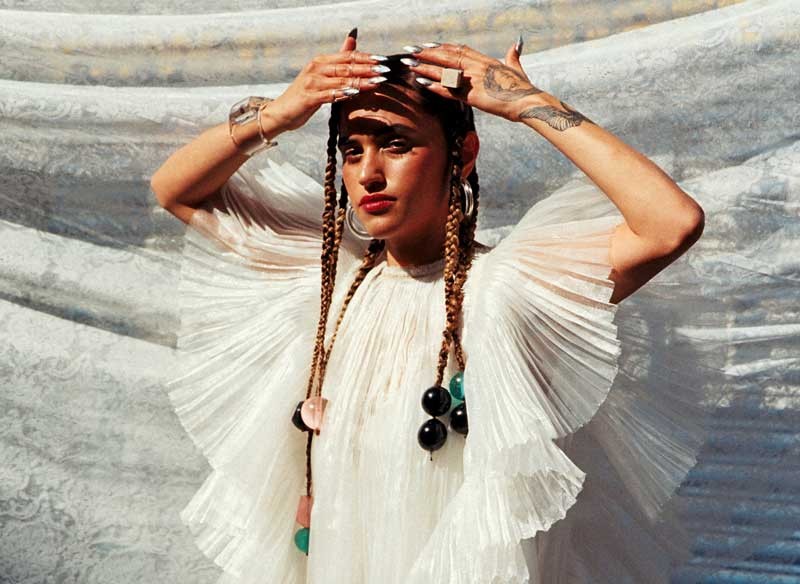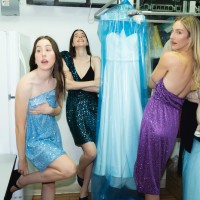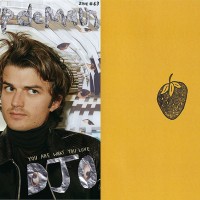Interview: Empress Of on her new album 'I'm Your Empress Of'.
Interview: Empress Of on her new album 'I'm Your Empress Of'.

"I've always felt that once a song is done, and the emotion is there and it's not inside me anymore, it belongs to the world," Empress Of (real name Lorely Rodriguez) shared in a statement about her third studio album, 'I'm Your Empress Of' - an album which is so full of emotions; from cries of desperation on 'Love Is A Drug', to relationship pains on 'Maybe This Time', to an acknowledgement of self-growth in the stunning album closer, 'Awful'.
Interwoven throughout the album (which was produced entirely by Rodriguez aside from two songs) are recordings of her mother speaking about various things ("Being a woman is not easy. Women can be misinterpreted, but you made yourself the woman you want to be"), which add another layer to the depth of the stories told throughout the twelve songs.
We spoke with Rodriguez ahead of the album release to discuss exploring being a woman in the album, recording her mother's spoken-word poetry, and the pain of toxic relationships...
...a learning thing about how you want to be treated and how you want to be viewed, and when you don't want to be stepped on, and when you're overcompensating, and when you're doing too much - all those things; I feel like I learned a lot. In the last year with touring and being heartbroken and being single, I just learned a lot, and I put them in the songs. So I feel like this record is an arrival point in my life at the moment.

COUP DE MAIN: How do you feel about sharing this project with everyone? It's such a strange time at the moment, but it's nice that art can still be there for people as an escape.
EMPRESS OF - LORELY RODRIGUEZ: I feel really excited. There's a lot of doubt about everything in the timing and not being able to tour the record because of Coronavirus and everything sort of just shifting - like, my plans, but honestly, it's such an immediate record that I just feel like it needs to come out immediately as well.
CDM: You've said that once you finish songs and the emotions are in the song, they are no longer inside of you. Was this album-writing process cathartic in helping you to process your emotions?
LORELY: Yeah, of course. I mean, that's a huge reason why I write music. It's a very big part of my work that I'm doing with myself and my growth; it's just therapy. It's helped me understand myself better. I'm really, really horrible at communicating in relationships and friendships and with family. I feel like writing songs is my outlet for expressing myself.
CDM: You're not able to perform live at the moment but when it does come to performing your songs live, do you kind of find yourself reliving the emotions that are contained within the songs?
LORELY: Yeah. For me, being able to tour a record is a massive part of a record campaign. It feels weird not to be able to tour a record right now while putting out an album because it's part of the storytelling - it's part of engaging with people past the streaming platforms and the records, the vinyl, the headphones. I'm on-stage and they're seeing sweat on my face and they're seeing emotions, and it's just such an exciting way as an artist to bring your music to a full 360 experience of what it is.
CDM: You recorded your debut album ‘Me' entirely yourself, and then 'Us' had a few more writers and producers involved back in LA, and now this new project was mostly written and produced by just you. Why was that an important thing about working on this particular project to have that ownership over it?
LORELY: It's not really ownership. It's just how this record came about. I think you're the third interview I've done for the record, but everyone's like, 'Why did you decide to produce the record this time?' I think the important thing to know about this record is that I was touring the world, and I had two months off, and I didn't have sessions booked or anything like that in LA, it was time off to recoup my body and to spend time with my family and just regain my energy so I could go back out and do another run. I had all this stuff going on that I hadn't processed emotionally because I was on tour, and so when I got home, I would go to sleep, I'd wake up, jump out of bed at 8am, and I'd just start making music. It just came out of this beautiful rush that I had to just make stuff, which doesn't happen very often. I feel a lot of artists have this creative separation of the clouds and you just have a breakthrough... I feel like that's what this record is. Me producing most of it is just because I had the time off before my next run of touring, and I just got out of bed, worked on music all day and saw my friends at night.
CDM: That's cool that it was just a natural process! I feel like some of the best music comes about when you're not planning to do it; it feels like a full expression of you.
LORELY: Yeah. There was nothing planned, there was no session, the only thing that came about with other people is the Jim-E Stack track, and Jim-E is a collaborator that I've just really connected with over the last two years. It's so natural, I'm just hitting him up through texts and being like, 'Yo, let's work today,' or, 'Let's work next week.' The two collaborations with producers on the tracks, they're my friends, and we just happened to write those songs together.
CDM: It feels so familial to have your mother's spoken word poetry appear on the album - from the first track! Were they things she specifically wrote for the album? When did you decide you wanted them to be a part of the album?
LORELY: First off, my mom is a legend. She didn't plan any of the stuff that she was saying on the record. I told her to come over and I told her, "Hey, Mom, I want to record you talking for my album." And she's like, "Okay," and so she comes over to my studio that's in my house, and I turn on the mic and she's like, "I don't know what to say." And I'm like, "You always talk so much shit. Say all the things that you say when the microphone isn't on." I was like, "Talk about being a woman. Talk about being an immigrant. Talk about being a mother. Talk about being a lover." Then it all just kind of spiralled out, and she even quotes one of my own songs, 'Woman Is A Word'. She says, "Woman is a word that you make yourself the woman you want to be." She did all the audio on the record over the first track, and then I sort of cut-up bits and used it for the rest of the album. She hadn't heard the rest of the record, but she felt something and she just channelled it.
CDM: I love the part in 'U Give It Up' when your mother says, "Being a woman is not easy. Women can be misinterpreted, but you made yourself the woman you want to be." Why was exploring the idea of being a woman something you wanted to talk about in this album, through some of the lyrics that you sing in the album but also through some of the things that your mother says?
LORELY: Where I am in my growth as a woman is very important to the record. I don't want to be a cliché, but I feel very womanly on this album. Maybe that's just a learning thing about how you want to be treated and how you want to be viewed, and when you don't want to be stepped on, and when you're overcompensating, and when you're doing too much - all those things; I feel like I learned a lot. In the last year with touring and being heartbroken and being single, I just learned a lot, and I put them in the songs. So I feel like this record is an arrival point in my life at the moment.
CDM: In 'Love Is A Drug' you say that "I just want to be touched." From the five different love languages, is your main one physical touch? Do you think that having incompatible love languages can make relationships harder?
LORELY: I think that what I mean by that is that it's not about love language, it's more desperation. It's about the times of night when you just pick up your phone and you're just like, 'Who can I text?' I know these things can become addicting, but I'm toying with the idea. I'm risking being desperate because I need to fulfil something. It's just desire and that text, you know?
CDM: Why do you think that craving someone else's person is such an addicting thing for people? Do you think it's what it does to our brain, or just societal that we think we need to have someone?
LORELY: I think distractions... I think there's a lot of things... and I wrote that song from a place of having broken up with someone and I was trying to fill that 'Void' - which is another song on the album. <laughs> It's craving a distraction from my own madness. It's craving a familiar touch, and human affection. It's just all those things that make you feel less alone in life. It's just desperation. If there's a big word on the record, it would be desperate.
CDM: That's cool to hear you being so open about that because I feel like sometimes women are taught that they shouldn't be needy, or desperate, and that it's something to be potentially ashamed of because it's something which isn't spoken about very much.
LORELY: I talk about a lot of things on this record that are not attractive because I am just talking about all the parts of me at that moment. Like on 'Give Me Another Chance' I say, "Choose me over her," that song is such a desperate song. I've got to look up other words for that. But in that song, I feel like I'm saying embarrassing things but I'm getting away with it because the beat is so cool and the delivery is real - you can hear breaks in the vocal on this record. I'm not worrying about being perfect on every vocal take. I just want to sing from the heart, and I think that helps with singing about things that are not cool.
CDM: You're so honest in 'Maybe This Time' when you sing, "I don't know what else to do / Than break myself for you / Maybe this time you'll feel me, feel me, feel me / Baby you hurt me, hurt me, hurt me." Even though it talks so much about pain, there's still hope in each time you sing the word maybe. Do you think even when we know situations are wrong, there's still a glimpse of hope that keeps us in it sometimes?
LORELY: I think that when you like someone so much or love someone so much that you're blinding yourself from the reality of the relationship, that it's toxic. That song is about a toxic relationship and fighting and like, "Where's the edge? When is this going to be too much for me?" The way I sing it, I'm definitely still there. I'm still dealing with it. I'm still in the room with the other person and I'm still in the relationship, and maybe that's what you can hear in the song.
CDM: 'What's The Point' is a really poignant and heartfelt song. In it, you sing, "I love you, I know it's wrong." Why do you think that it can be so hard to get out of a relationship, even when you know it's not working?
LORELY: Ending a relationship is a hard thing for most people. It's because people are afraid of change. People are afraid of hurting someone else. People are afraid of being alone, and when I say that in the song and that sentiment overall on the record, it's about being with someone who's not right for you. And you're just too deep in. And it's all those things. You love the wrong thing.
CDM: "I'd love to move on but you're always there," you sing in 'Awful’. Do you have any advice for people who are going through a situation like this, when trying to move on from something in their past? If there's any way to avoid those triggers that might bring stuff back for people?
LORELY: I think it comes from you - you have to evolve and you have to grow and you have to put in the work. You have to recognise that. I mean, at least in my case, whenever I'm confronted with something that's triggering from a relationship, I have to realise that's not where I am in the present. It's really hard, but you have to let go of things, because you're not in that relationship for a reason. I'm not an expert on relationships, I just wrote that song because I was trying to move on and it was really hard. Especially with Instagram, and technology, and even on Spotify seeing what someone listens to.
CDM: With social media, we are so accustomed to knowing what someone is doing, every minute of every day - it can definitely be unhealthy.
LORELY: It's so unhealthy! But I do love that song 'Awful', and I love the way it ends the record. I feel like you go through a dance on this record where you're like, 'Oh, I'm a little sloppy. I'm a little sexy. Here's the one night stand. Here's a vulnerable moment. Here's the 1am desperate texts. Here's the break-up song. Here's the one where I'm absolutely wrecked.' And it ends on a really confessing note where that song is so raw, even the part where it's like, 'I need some help, I need help, I need myself, I need myself.' I feel like someone needs to hear that because I needed to sing it.
CDM: It's like a hug in song-form! Especially the mantra bit which is like, "I have to reinvent myself," it's a realisation of doing it for yourself.
LORELY: Yeah! I remember when I wrote that song, I sent it to a friend and she was like, "This is fucked. Do you know what's going on with me right now? I'm going through the same shit." It's such a raw song and it is true. I love the lyrics, "I find myself saying things that you say," it's a very nuanced thing, little body language things that we get from our past relationships that even remind us of them - but we just have to let them go.
Empress Of's new album 'I'm Your Empress Of' is out now - watch the 'Give Me Another Chance' music video below:




















